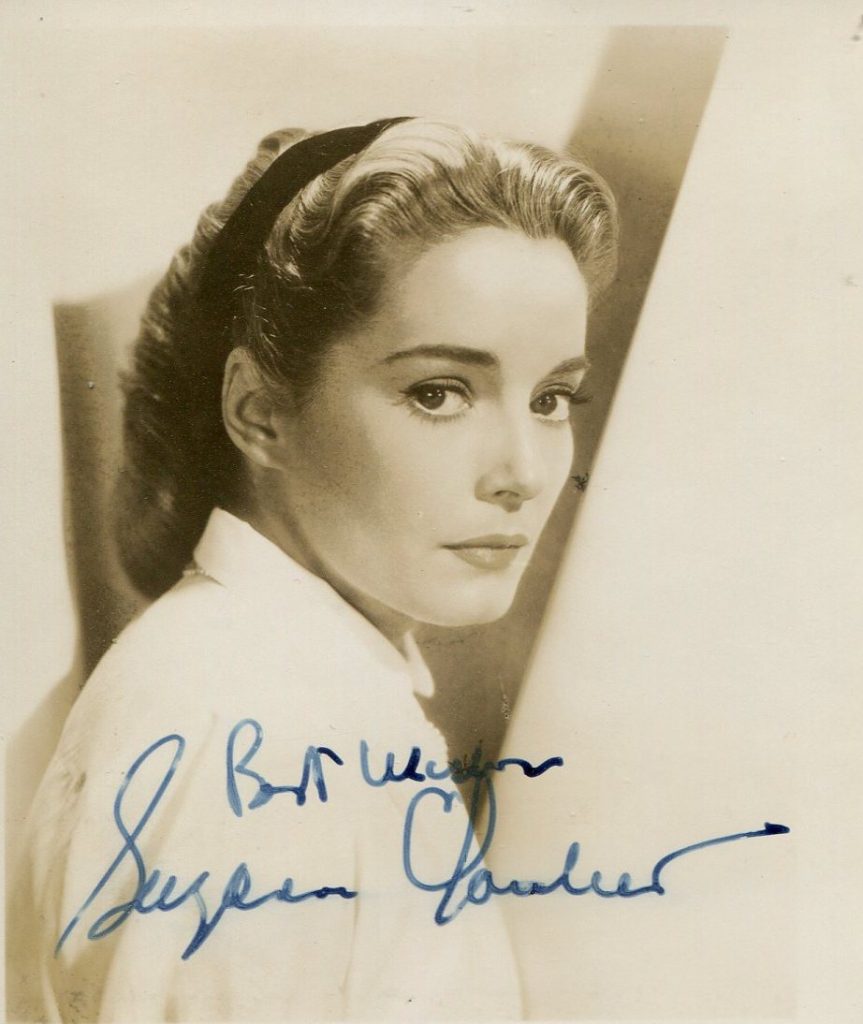
Ronald Bergan’s 2003 obituary from “The Guardian”:
In reality, Welles had spent months trying to seduce her, but she resisted. Because of that rejection, he could be brutal towards her. Once, at dinner, surrounded by the rest of the cast, he snapped, “You contribute nothing to the conversation unless you talk about yourself.”
Michael MacLiammoir, who played Iago, wrote of Cloutier: “She is indestructible. She will discuss herself tirelessly for hours in French or English, in a faintly gilded clipped drawl (like sunshine on snow) without pausing for breath – even when she is silent you know that, like a cat, an immense activity is in progress.”
Welles spent hours trying to get a good performance from her. In a scene in which Othello (Welles) strikes Desdemona across the face, the director wanted her not to flinch from the blow, yet every time his hand moved, she (understandably) looked terrified.
David Thomson considered “she had no equal in standing still and looking beautiful”, and suggests the reason Welles picked her was because “the lady is a stooge to his Othello, not nearly as married to the Moor as Iago”. Actually, Cloutier gives a finely honed, poignant performance, despite some of the crude sound and editing. Several of her lines were dubbed by Gudrun Ure, and instead of reshooting long and medium shots which he had done with Padovani, he simply included them in the finished film, hoping the audience would not notice.
Mischievously, Welles contemplated dubbing her whole role. “I can’t wait to see what Cloutier’s reaction will be when she attends the premiere and finds out it’s not really her, at least not her voice, and in many shots, not her body, on the screen.”
Yet Welles must have thought highly enough of her, because he cast her in his one-act play The Unthinking Lobster, staged in English in Paris in 1950, about a female saint who appears in a corrupt Hollywood. Later she helped him find financing for his aborted film projects, The Other Side Of The Wind and Don Quixote.
Born in Ottawa, Cloutier became a Powers Model in New York at the age of 18, after running away the day after her wedding to an eminent Canadian doctor. As the marriage was not consummated, it was annulled. She was soon offered a small role in Temptation (1946), a “woman’s picture” starring Merle Oberon, and then joined Charles Laughton’s stage company for one season in New York.
During a period in Paris, she was a member of Jean Dasté’s Comédie Française touring company and appeared in two prestigious films: Julien Duvivier’s Au royaume des cieux (The Sinners, 1947), opposite Serge Reggiani, and Marcel Carne’s Juliette ou la clef des songes (Juliette Or The Key Of Dreams, 1950) in which she had the title role of the mysterious girl whom Gérard Philipe, in a prison cell, meets in his dreams.
Immediately after making Othello, Cloutier was in London to play in Herbert Wilcox’s Derby Day (1950), a four-part picture with Cloutier as a film fan winning a star (Peter Graves!) in a raffle. At the same time, she met Peter Ustinov. Coincidentally, Ustinov had seen a photograph of the “strikingly beautiful girl” on a French magazine cover three days before his French agent introduced them backstage during a production of his play The Love Of Four Colonels. She told him she was on the run from Welles, who was searching for her to fulfil a contract for which she had not been paid. She also told him that her mother was a German Jew and that her father was descended from an Indian chief, neither of which turned out to be true.
“People were enchanted by her freshness,” explained Ustinov in his autobiography, “her extraordinary capacity for invention, and her acumen in pursuing her ends, and I must admit, I was among them.”
They appeared together in Ustinov’s play No Sign Of The Dove at the Piccadilly Theatre (1953), and were married a year later. Except for a role in Doctor In The House (1954), Cloutier was busy during the decade bringing up their three children, Pavla, Igor and Andrea, all of whom survive her.
In 1961, she resumed her acting career briefly with Ustinov in his play Romanoff And Juliet. Gradually the marriage broke down; Cloutier disliked England and the English, and Ustinov became disenchanted with her ever-increasing Québecois nationalism. They divorced in 1971.
Cloutier no longer worked as an actor, but she remained busy as an artistic adviser to various film festivals in addition to producing two musical documentary films. She returned to Canada in 1988, living in Montreal.
· Suzanne Cloutier, actor, born July 10 1927; died December 2 2003
The above “Guardian” obituary can also be accessed online here.


